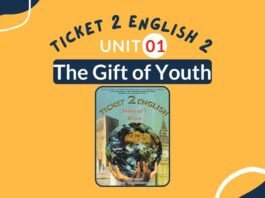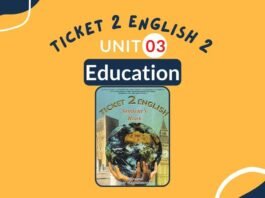In this post, you will find a brief summary of the important topics discussed in “Ticket 2 English Unit 9 Advances in Science.” The summary covers the vocabulary, functions, grammar, and writing elements discussed in the unit. By going through this post, you will have a better grasp of the material and be better prepared to score high marks in your national exam.
TABLE OF CONTENT
- Vocabulary
- Functions: Expressing Certainty and Uncertainty
- Grammar: Conditional 3 / Wishes
- Writing: Advantages and Disadvantages Essay
Vocabulary Ticket 2 English Unit 9
The differences between science and technology
Science:
It focuses on general knowledge. It is the process of producing knowledge via observations and investigating natural phenomena. Examples: math, physics, chemistry, astronomy ……
Technology
Applied science is the ability to change the world with materials; it is practical. Examples: robotics, biotechnology, communication, engineering ……
Some vocabulary related to Technology
- Algorithm: a set of instructions designed to perform a specific task.
- Cloud: a network of remote servers used to store, manage, and process data.
- Cybersecurity: the practice of protecting computer systems and networks from digital attacks.
- Encryption: the process of converting data into a code to prevent unauthorized access.
- Firewall: a security system that monitors and controls incoming and outgoing network traffic.
- Interface: the point where two systems, subjects, organizations, etc., meet and interact with each other.
- Malware: software that is intended to harm or disrupt a computer system, such as viruses or spyware.
- Operating system: software that manages computer hardware and software resources and provides common services for computer programs.
- Server – a computer or program that manages access to a centralized resource or service in a network.
- Wi-Fi – a wireless networking technology that allows devices to connect to the internet or other networks.
Some vocabulary related to Science
- Physics: The study of matter, energy, and the fundamental forces of nature, aiming to understand the behavior of the universe at both macroscopic and microscopic levels.
- Chemistry: The study of the composition, properties, and behavior of matter, as well as the changes it undergoes during chemical reactions.
- Biology: The scientific study of living organisms and their interactions with each other and their environment, encompassing areas such as genetics, evolution, ecology, and physiology.
- Mathematics: The abstract study of numbers, quantities, structures, and patterns, using logical reasoning and abstract concepts to explore relationships and solve problems.
- Astronomy: The study of celestial objects such as stars, planets, galaxies, and the universe as a whole, aiming to understand their origins, properties, and interactions.
- Geology: The study of Earth’s physical structure, composition, processes, and history, including the study of rocks, minerals, earthquakes, and geological formations.
- Botany: The scientific study of plants, including their structure, growth, reproduction, and interactions with other organisms and the environment.
- Zoology: The scientific study of animals, encompassing their behavior, physiology, evolution, classification, and interactions with their ecosystems.
- Meteorology: The study of Earth’s atmosphere, weather patterns, and climate, aiming to predict and understand atmospheric phenomena and their impacts.
- Oceanography: The scientific study of the oceans, including their physical, chemical, biological, and geological properties, as well as their interactions with the atmosphere and land.
Functions: Expressing Certainty and Uncertainty
Certainty is the state of being sure about something. It’s when you do not doubt it.
Uncertainty is the antonym of Certainty. It is when you are unsure or doubtful about something.
How to Express Certainty
- To be sure about…………
- To be sure about………….
- To firmly believe that………..
- It goes without saying.
- To be convinced of……………
- To not doubt it.
- To not doubt about………
- Without a doubt, ………………….
- It’s evident that………….
- ’The modal verb ‘Must’ also expresses Certainty.
How to Express Uncertainty
- To be not sure about………
- To be not sure about…….
- To strongly not believe that………
- To have doubt about…………
- To doubt that………
- To be in two minds about ………….
- ’The modal verbs ’May and might’ also express Uncertainty.
- To feel uncertain about………
- Perhaps.
Examples of how to express Certainty and Uncertainty
Speaker 1: Sohayb is a hardworking student.
Speaker 2: I am sure/confident he will have a good grade. (Certainty)
Speaker 1: I firmly believe that our local football team will win the match (Certainty)
Speaker 2: With their actual level, I doubt it / I feel uncertain about it. (Uncertainty)
Speaker 1: Do you think that Hillary Clinton will be the president of the USA
Speaker 2: I am in two minds about that. (Uncertainty)
Speaker 1: Well, it goes without saying that she will win the elections. (Certainty)
Grammar: Conditional 3 / Wishes
I. Conditional type 3
[If + Subject + Verb (past perfect) + complement]
[subject + would + verb (present perfect) + complement]
- If she had taken her umbrella, she wouldn’t have gotten wet
- Tom would have had better marks if he had revised his lesson.
Example
Source sentence: I didn’t play sports. I was fat.
Target sentence: If I had played sports, I wouldn’t have been fat.
The use of conditional type 3
When we use conditional type 3, we refer to an impossible situation in the past. We wish for the opposite of that situation.
Last month Ann was sick. Her friend Joan didn’t know this, and she didn’t go to see her. They met again after Ann got better.
Joan said :
If I had known that you were sick, I would have gone to see you.
”This means that she didn’t know Ann was sick, so she said:““If I had known….”“This means that Joan didn’t know Ann was sick, so she said: “If I had known….”
And she didn’t go to see her.
II. Wishes
Steps to follow :
- We look at the verb in the source sentence, if it is in the simple present, then we change it to the simple past, and if it is in the past, we change it to the past perfect.
Present wish:
It is a situation in the present that we don’t like, or we like to have it the other way.
Tom lives far from school, so he usually arrives late.
Tom: I wish I didn’t live far from the school. If only I didn’t live far from the school.
Source sentence: I don’t play sports. I am fat.
Target sentence: If only I played sports / I wish I played sports
Past wish:
It is a situation in the present that we don’t like, or we like to have it the other way.
Tom had an accident because he drove very fast. If only he hadn’t driven very fast, or Tom wishes he hadn’t driven very fast.
TIP: Look at the verb. If it is affirmative, change it to negative; if it is negative, change it to affirmative.
Source sentence: I didn’t play sports. I was fat.
Target sentence: If only I had played sports. / I wish I had played sports
Writing: Advantages and Disadvantages Essay
An advantages and disadvantages essay is a type of argumentative essay that presents both the benefits and drawbacks of a particular subject or issue. The essay should present a balanced view and include both sides of the argument, although the writer may choose to present one side more prominently.
It has the same structure as the Cause/Effect essay. Just change the word causes to advantages and the word effects to disadvantages.
I. Introduction
Explanation of the issue
II. Body
- Paragraph one: Advantages
- 1st advantage.
- 2nd advantage.
- 3rd advantage.
- Paragraph two: disadvantages
- First disadvantage.
- Second disadvantage.
- Third disadvantage.
III. Conclusion
State a summary of your point of view.
—————————–
I. Introduction
…………………………. is a great invention that has numerous advantages. Yet there are many disadvantages too. So what are the positive and negative sides of ……………….
II. Body
There is no doubt that …… (the subject you are discussing) ……………. has many advantages….. To begin with, ……………(1st advantage)…………………. Next, …………….(2nd advantage )…………………….. In addition to this, …………………(3rd advantage)………...On the other hand, it has disadvantages too.………..(1st disadvantage)…………………………. Secondly, ……………..(2nd disadvantage)………..Thirdly, ………….(3rd disadvantage)……………….
III. Conclusion
As mentioned before, ………………..(your subject matter)……….has many disadvantages on …………………………. Hence there are several measures to be taken urgently. First………….second………………finally…………………….
An Example of Advantages and Disadvantages Essay (1)
Introduction
A smartphone is a great invention that has numerous advantages. Yet there are many disadvantages too. So what are the positive and negative sides of this invention?
Body
There is no doubt that a smartphone has many advantages. To begin with, a smartphone allows people to stay connected with others at all times through phone calls, text messages, and various social media apps. Next, It provides access to vast information and resources through the internet and various apps. In addition to this, It offers a wide range of entertainment options, including games, music, and movies. On the other hand, it has disadvantages too. Some people may become addicted to their smartphones and spend too much time on them, leading to a lack of productivity and social isolation. Secondly, Prolonged use of smartphones can lead to several health problems, including eye strain, neck and back pain, and sleep disturbance. Thirdly, The production and disposal of smartphones can hurt the environment.
Conclusion
As mentioned before, smartphones have many disadvantages for humans and the environment. Hence we should use them wisely.
An Example of Advantages and Disadvantages Essay (2)
Introduction
Social media has become an integral part of modern society, with billions of people worldwide using platforms such as Facebook, Twitter, and Instagram to connect with others and access information. While the use of social media has many benefits, it also has several drawbacks. This essay will examine social media’s advantages and disadvantages and consider how it has impacted our lives. By exploring both sides of the issue, we can better understand social media’s role in our society and how to use it responsibly.
Body
One of the main advantages of social media is the ability to connect with people worldwide. This can be especially useful for maintaining relationships with friends and family who live far away and making new connections. In addition, social media platforms provide access to vast information and news from various sources. This can be a great way to stay current on current events and learn about new topics.
However, there are also several disadvantages of social media. One concern is the potential for addiction, as some people may spend too much time on these platforms and neglect other areas of their lives. In addition, social media can be a breeding ground for cyberbullying, which can have severe consequences for victims. Finally, privacy concerns are associated with social media, as these platforms may collect and share personal information. It is essential to be mindful of these potential drawbacks and use social media responsibly.
Conclusion
Overall, the advantages and disadvantages of social media depend on how it is used. While it can help connect with others and access information, it is crucial to be aware of the potential risks and use these platforms wisely.





Hello,
it’s an amazing site . yet expect for this lesson ” wishes” i think there is a mistake
Past wish:
It is a situation in the present that we don’t like, or we like to have it the other way!!
Excellent site you have got here.. It’s hard to find good quality writing like yours nowadays. I seriously appreciate individuals like you! Take care!!
Hi everyone, it’s my first pay a visit at this website, and post is truly fruitful designed for me, keep up posting such articles or reviews.
yeah me too i really appreciate this spectacular website. because it is full of rich and prosperous informations that can help both students and english teacher to get a clear idea on how to design an effective lesson plan.